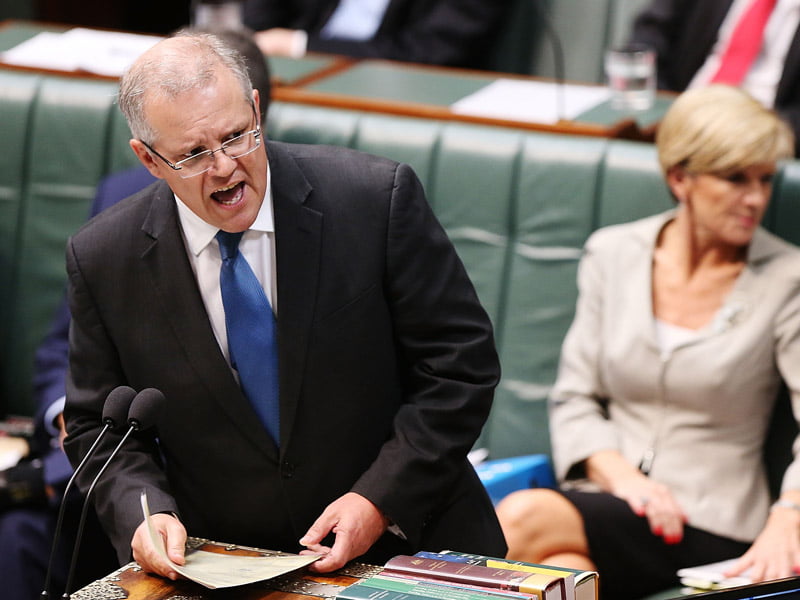Australia is on the verge of a revolution in its financial industry. It will not happen overnight, but all the signs are there. The growth of FinTechs has happened very quickly and very recently, and has already stood the sector on its ear.
But for the financial services industry to undergo the same disruption as we have seen in some other industries, the regulatory environment has to change. Technology alone is not enough. That is now starting to happen.
Financial services is one of the most regulated of all industries. The budget handed down by Treasurer Scott Morrison on Tuesday night contained a number of big ticket items such as the levy on the major banks, but a single line, unnoticed by many, has the potential to be far more important.

“The introduction of an open banking regime in 2018 will give customers greater access to their own data, empowering them to seek out better and cheaper services.”
The Treasurer did not go into greater detail, but he was quite open about what this means in an interview he gave to the Australian Financial Review a few days before the budget.
“You’ve got the open data inquiry from the Productivity Commission. That is another area that provides opportunity for consumers, greater control over their own information, that empowers them in the banking and financial system. Open data does have real potential to benefit banking customers,” he told the AFR this week.
The Government has had a draft of the Productivity Commission open data report since last November. The final report was handed down just this week. It recommends, amongst other things, the development of an Open Banking standard similar to that recently adopted in the UK.
The Commission has now been asked to conduct another review, into competition in the banking sector. The winds of change are blowing.
The FinTech industry has welcomed the moves. “The introduction of an open data regime in the financial sector will open up all kinds of innovation opportunities for the FinTech community,” FinTech Australia CEO Danielle Szetho told InnovationAus.com.
“We’ve already seen great FinTech products emerge that help consumers manage their finances and improve their financial wellbeing. Apps and tools like Acorns, Pocketbook and MoneyBrilliant are all dependent on having secure and continuous access to accurate personal financial data.
She says that currently consumers can only provide new financial entrants access to their bank data either by downloading CSV files of their transactions, which is cumbersome and out of date as soon as it is created, or through a data aggregator.
“Data aggregators fill an important gap in the market, but are sometimes blocked by banks, who at times don’t like the techniques they use to obtain data.”
Banks have been resisting attempts to make it easier for customers to access their data and share it with potential competitors, but the new open banking regime will change things substantially.
“Imagine a world where someone could, at the click of a button, instantly and securely pre-populate the majority of the deductions in their tax return by connecting their financial data through their budgeting app, rather than having to visit a tax agent,” says Ms Szetho.
“Or a world where someone could port all their deposit accounts (including all their financial history) to a different bank, as easily as they currently change mobile phone providers, to respond to better deals and customer service.”
That is what open banking promises. Little wonder the banks are resisting, and little wonder the Productivity Commission and the Government see it as a way to increase competition in the sector.
Bosco Tan, Chief Operating Officer of Australian FinTech Pocketbook, a personal finance expense tracker, has also welcomed the move to Open Banking.
“Access to data will empower customers,” he says. “Strong data sharing ecosystem will put Australia at the forefront of innovation. What we find even more interesting are the potential developments that have yet to be even considered based on the current state of play.
“Australian should leverage off the design and implementation of international initiatives such as those in Europe (PSD2) and the UK. That will help make Australian FinTech companies more competitive globally.”
The Treasurer announced the new Productivity Commission inquiry into the state of competition in the financial system on 8 May, the day before the budget. In a busy week in politics, it has been a little overshadowed.
“The Government is committed to ensuring that Australia’s financial system is competitive and innovative,” he said when announcing the inquiry.
“Competition is central to the Government’s plans to support innovation and economic growth, and deliver better outcomes for consumers and small businesses. The inquiry will consider the level of contestability and concentration in key segments of the financial system, including the degree of vertical and horizontal integration.”
Mr Morrison said the inquiry will begin on1 July 2017 and is due to report to the Government within 12 months of that date. Its findings will no doubt have a bearing on the way the open banking regime will work.
Do you know more? Contact James Riley via Email.

